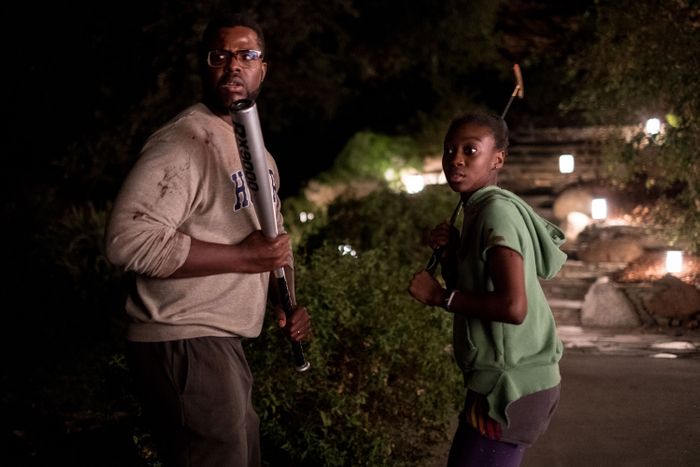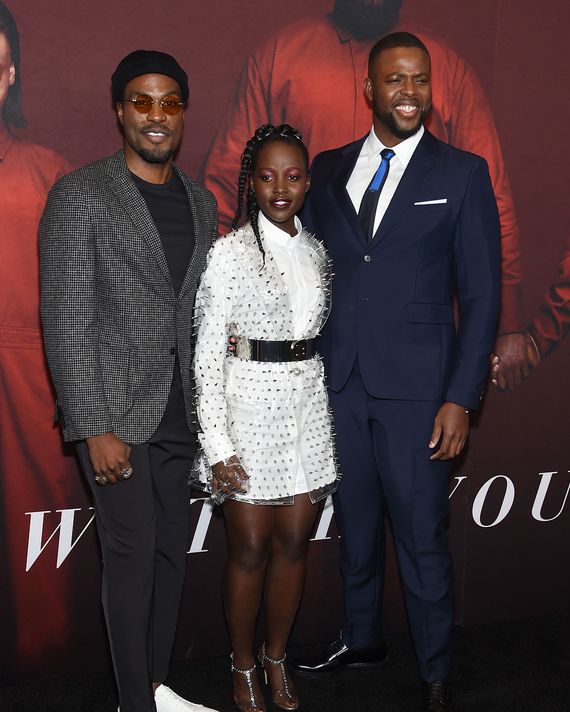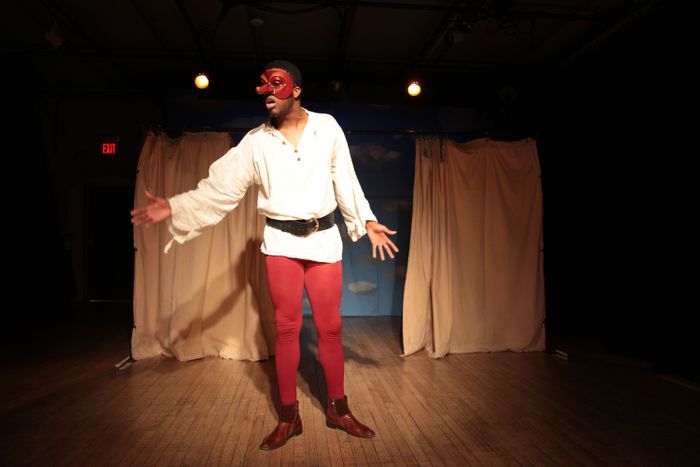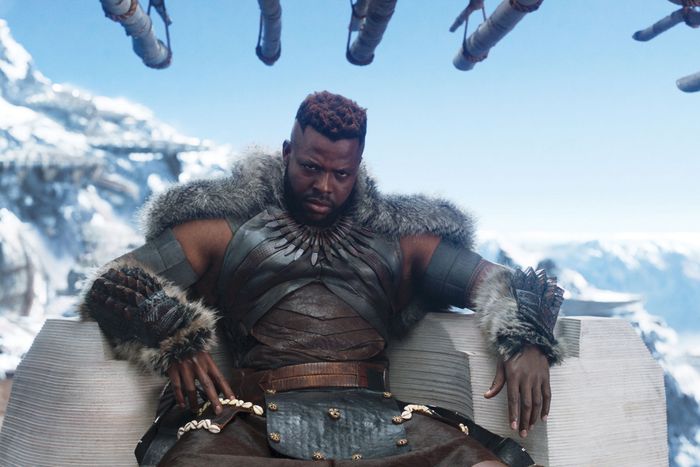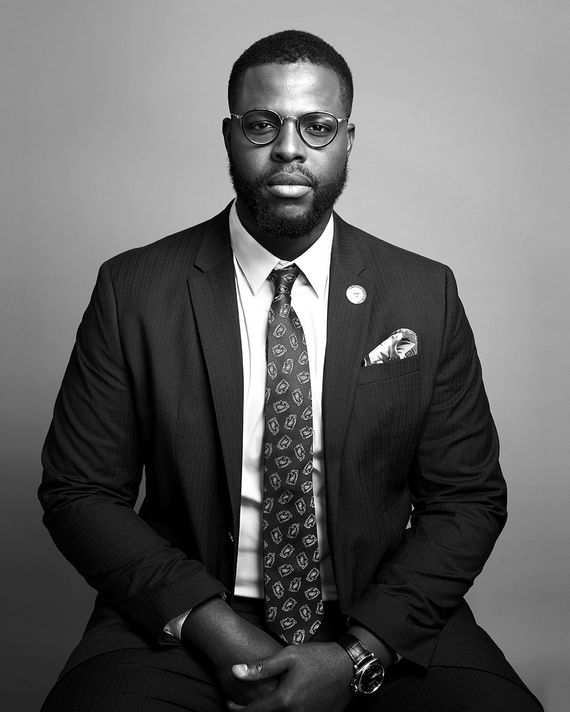
When Winston Duke was a teenager in Brighton, New York, the kids at his high school started calling him a “close talker.” The term — plucked from a five-year-old episode of Seinfeld — unnerved him, since he felt like he was standing as close as anyone else would in conversation with people. Finally he realized what was going on. Duke, an immigrant from the Caribbean by way of Brooklyn, had a growth spurt at 13. He wasn’t just one of a few black students in a school that was 80 percent white, he was black and big. His physical presence put people on high alert.
For Duke, acting has been a way to own his hyper-visibility, “to utilize it for my personal growth and edification rather than my destruction.” He is 6’ 5”, with a wrestler’s physique, and unlike many tall men, he stands up straight. A conversation with him often returns to the subject of his body. “My body takes up a lot of space. My body is politicized. My body is so many different things,” he tells me. His explosive career thus far has been an exercise in working through all this loaded meaning, and getting to a place where he can tell new stories about the way a man with his body can exist in the world.
We’re in the basement of the Whitby Hotel in Midtown, near the end of what seems to be a long day of press for Jordan Peele’s Us, in which the 32-year-old actor plays both a bougie NorCal dad and his murderous doppelgänger. This week, he’ll pop up briefly in Avengers: Endgame, reprising the character of M’Baku, the leader of a breakaway Wakandan tribe, that he originated in Black Panther. (Duke’s presence in the film isn’t exactly a spoiler: M’Baku survived the massive third-act dust-up in last year’s Infinity War.) Endgame is conservatively estimated to gross a gajillion dollars, while Us, the smallest film in his brief filmography, is close to crossing the $200 million mark. In a sense, Duke is something like the John Cazale of modern blockbuster cinema. He’s aware of this: “Everything I do blows up.”
Duke was right; he’s not a close talker. In person he sits back languidly on a couch, though when I ask what he’s wearing, he helpfully leans forwards and turns the neck of his shirt up to show me the label. (It’s a gray plaid tracksuit from Rag & Bone — comfy, but make it fashion.) His friends often talk of his size and his generosity as if they are one and the same — and sometimes, as in a story actor Mamoudou Athie tells me about Duke breaking an apple in half with his bare hands in order to share it, they are. In conversation, he’s got a habit of making people feel comfortable by repeating the thing you’ve just said back to you, with great emphasis. He speaks slowly and chooses his words carefully, but when he talks about past roles he often slips back into character. He has, as anyone who’s seen Black Panther knows, a fantastic laugh.
Duke grew up on Tobago, a small island that sees roughly seven times as many tourists a year as it has residents. He was raised by a single mother, and spent much his childhood watching TV — everything from Fresh Prince to Golden Girls. “I don’t think Americans understand how big their exports are,” he says. “American culture, the American Dream, is this huge export.” In Tobago, young Winston was exposed to sitcom versions of places like Chicago, where a middle-class black family was tormented by their nerdy neighbor, and San Francisco, where a single father could raise his three daughters with help from two other adult men. When he was 9, Duke and his family moved to the U.S. so that his sister could attend medical school. They landed in Crown Heights, back when the neighborhood was still almost entirely black. He carried with him a vision of sunny suburbs with bright green lawns and even brighter Volkswagen Beetles, of Puff Daddy and Ma$e in shiny silver jackets. “It was wealth and comfort, comfort and safety,” he says. “And the part of Brooklyn we settled in didn’t look like any of that.”
The gap between the American dream and the American reality has been on Duke’s mind thanks to Us. In the movie, households across the country are terrorized by their jumpsuit-clad doubles, known as the Tethered. Gradually — and here you can skip ahead if you haven’t seen it — we learn the Tethered are clones, created in a vast underground lab connected by tunnels across the United States, and bound to a lifetime of suffering. What looks to us like a homicidal rampage is for them an attempt at liberation. The film taps into a timely set of anxieties: the slow realization that the life you’re enjoying is the result of a thumb on a scale, and the worry of what might happen if that thumb were removed. “That Jordan Peele fear is a deep fear,” says Duke. “It’s a fear of the tidal wave.”
To play buppie patriarch Gabe Wilson, Duke based his performance on the sitcoms dads of his youth. (Though the character’s voice, nasal and West Coast, was inspired by Peele himself.) As Gabe, Duke was tasked with embodying the soft underbelly of the lifestyle he’d seen on TV. “The status, the house, the trophy family,” he says. “He is the perfect example of comfort and privilege, so much so that it’s crippling.” At Peele’s direction he stopped working out; his body became round and congenial. He moved differently, too. Inherent in privilege is a lack of awareness, says Duke, so he decided Gabe would carry himself with a sense of breezy ignorance. When the Tethered appear in their driveway, he assures his family, “Maybe it’s the neighbors,” before he bounces out the door to greet them. Once it’s clear they’re not the neighbors, Gabe retreats into an imagined idea of blackness. He adopts “the ‘big black man’ voice that you’re taught not to use because it’s intimidating. It doesn’t scare them away,” Duke says. “It’s useless because it’s not real.”
Duke sees Peele’s social thrillers as an ideal form for interrogating these lizard-brain assumptions. “The trope of ‘the black guy dying in the beginning’ or ‘the woman tripping in the forest’ — what if she doesn’t trip? What if the black guy doesn’t die? What else dies instead? Maybe it’s the construct of racism.”
Not of all Duke’s acting opportunities have afforded such vision. After graduating from drama school, Duke found out very quickly what the industry had in mind for someone who looked like him. He played a football star who commits a hate crime in Law & Order: SVU, a gang leader in Person of Interest, another football player in Modern Family. He was conscious of how both his race and size played into casting. Shorter actors are easier to frame, so tall men face a disadvantage onscreen. As Duke told Deadline’s New Hollywood podcast last year, he dealt with the problem by shaving an inch off his listed height. He was shrinking himself on paper, something he couldn’t do on set. “My thing was really getting outside of how to use the body,” he says of this period. “It was hard working through that until I got to a place where I could.”
In the meantime, regional theater helped keep his creative spark alive. It was a natural extension of the kind of acting he studied at The Yale School of Drama, where he first encountered his frequent collaborator, Lupita Nyong’o. (The pair have appeared together in half of Duke’s films, which is to say, two.) They met when Duke was an aspiring applicant and Nyong’o was a first-year assigned to show him around. It was the start of a decade-long friendship that retains a trace of big sister/little brother vibes. “He was very focused,” Nyong’o says of Duke as an student. “His gaze seemed to go way beyond the horizon.”
At Yale, Duke found a cohort of black actors, many of whom, like The Frontrunner’s Athie and Aquaman’s Yahya Abdul-Mateen II, are seeing their stars rise alongside his. Much of this fellowship came thanks to Folks, a group for black actors co-founded by his future Black Panther costar Angela Bassett. For Duke, who’d been navigating white spaces since leaving Crown Heights, “it was a reprieve,” he says. “A place to ground yourself in culture; a space where you could eat fried chicken for fun without it being tied to anything but your love for greasy food.” Stage work provided a similar opportunity to explore without preconceptions. Every Yale Drama student must take a clown class, where they are assigned a clown name. Duke’s was “Loose Zeus the Third, But I Wish It Was Joseph Levine, No Relation, a.k.a. Sammy Cupcakes.” (Lupita’s was “Fatty.”) Already very experienced at playing big, as a clown Duke learned for the first time how to be tiny. “Clowns are the most innocent aspect of who you are,” he says. “All things are possible because imagination governs them. That’s why it’s a totally ambitious name. It’s me wanting to be more than the world conditioned me to want to be.”
Talk to anyone who overlapped with Duke in New Haven, and they all mention the same role. In a commedia dell’arte project, Duke got the part of Il Capitano, a swaggering mercenary prone to outlandish promises. For the part, he devised a bawdy monologue addressed to an anthropomorphized female America, skewering the country as only someone who’d seen it from the outside can. And he punctuated his boasts as only a true New Yorker could — with the made-up catcall “Girl, you so Dutch.” Where Little Sammy Cupcakes was small, Il Capitano was absolutely gigantic. It was a liberating experiment in making the boldest possible choices and seeing them pay off, and it seems to have been the Yale Drama equivalent of a quarterback winning the state championship. “Truth has no size,” Duke says. “You can do anything as long as it’s grounded in the circumstance.”
It’s a lesson that has served him well in his subsequent rise. “Winston takes up space and he’s not afraid to take up space,” says Mateen. “Not just with his physical size, but with his intellect and his personality.” Nyong’o recalls that, even among all the heavyweights in the Black Panther cast, Duke stood out. A firm believer in the power of over-preparation, he had arrived on set with his M’Baku perfectly formed. He committed so hard in the first table read that afterwards she approached him with some words of wisdom: “You’re going to blow up with this movie, so get your things in order.”
Lupita Nyong’o is not often wrong. In less than six minutes of screentime, Duke’s M’Baku was a revelation. The film introduced the world to what might be Duke’s signature pose: arms spread wide, shoulders reclined, legs akimbo, the actor occupying as much space as possible. In Us, Duke plays the posture for laughs; while his wife’s trying to open up, all Gabe can think about is getting laid. In Black Panther it’s something else — a young actor staking his territory. This may be your movie, but it’s my scene.
“He has a strong sense of himself, and I think that’s an amazing quality to bring to the table,” says Christopher Bayes, who taught Duke at Yale. “There’s a weird confidence, and a kind of pleasure. The actors I love the most are the ones who are thinking, Watch me do this. The pleasure of the performance is really part of what Winston’s bringing right now. In Black Panther, the little sparkle he had in his eye of, I don’t give a damn. How brazen that was. How exciting that was.”
Audiences agreed. When it comes to stars born in 2018, Winston Duke beat Ally Campana by a good eight months. People loved the way M’Baku barked at people who interrupted him, the way he cracked jokes about being a vegetarian, the way he eventually did the right thing at the end. They also loved his thighs. It was a kind of character viewers hadn’t seen before, and the subsequent thirst powered the blogosphere for months.
When I ask Duke how he feels about this, he slows down and repeats himself. He wants to make sure he won’t be misquoted, that the nuance won’t be lost. He’s spoken before about how the frenzy made him realize how hungry people were for a tall, thick black man with gaps in his teeth to be represented on screen. Today though, he admits that, while it was certainly good for the ego, he didn’t totally love the attention. “When they consume M’Baku that way, they’re really just consuming a one-dimensional idea of me and manhood,” he says. But the whole thing also got him thinking about how lucky he was. If he was a woman, he doubts that his objectification would be so roundly celebrated, or that he would be asked to participate in it. But that’s because for him, this level of thirst was merely inappropriate; a female co-star going through the same thing might be in actual danger. “It just shows that we are not a society of equality, even in how we consume each other sexually.”
These are the kind of complicated waters he’s still navigating as an actor who has been famous for less than 15 months. “It’s still pretty new,” Duke says, but as he’s answering the question, he realizes it isn’t. He starts to riff. “It goes back to the conversation about size,” he says. “I’ve been aware that almost everything I do blows up. If I’m disagreeable, I’m ‘angry.’ If I’m angry, I’m ‘belligerent.’ If I ever get to furious, it’s, ‘He’s out of control!’” But now, he says, the connotation has flipped: “If I make a small comment about my advocacy for feminism, it gets blown up into something that reaches a lot of different guys, gives them permission to think the same way. The positives are now as large and as far-reaching as the negatives, for once in my life.”



